01 May A Look Back at Folk School May Day Celebrations
Wishing you a happy May...

Wishing you a happy May...
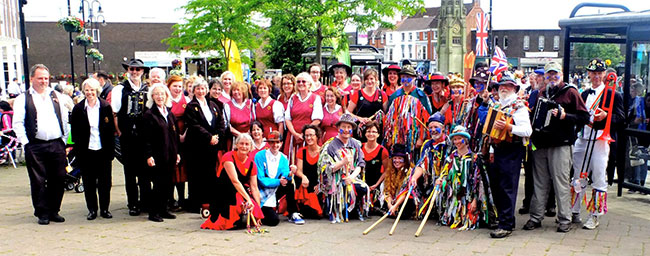 The Brasstown Morris Teams in England. (Carl and his red trombone are on the far right.)[/caption]
There are all sorts of traditions that are alive and well at the Folk School. The Brasstown Fire Department always brings the firetruck to spray down all the children during Little/Middle Folk School, we always dance the Salty Dog Rag during the evening break at Saturday night dances, and the Brasstown Brigade always helps us bring in the New Year with their black powder muskets. One of my favorite Folk School traditions is the Brasstown Follies, the talent show that happens each Winter Dance Week the night before New Years Eve. For as long as I've been coming to Winter Dance Week, the Follies have been organized and MC'ed by Carl Dreher - dancer, musician, magician, and all around Brasstown enthusiast. So enthusiastic, in fact, that he and his wife Charlotte Bristow recently retired and decided to move here from Texas. Let's meet Carl...
[caption id="attachment_12107" align="alignright" width="253"]
The Brasstown Morris Teams in England. (Carl and his red trombone are on the far right.)[/caption]
There are all sorts of traditions that are alive and well at the Folk School. The Brasstown Fire Department always brings the firetruck to spray down all the children during Little/Middle Folk School, we always dance the Salty Dog Rag during the evening break at Saturday night dances, and the Brasstown Brigade always helps us bring in the New Year with their black powder muskets. One of my favorite Folk School traditions is the Brasstown Follies, the talent show that happens each Winter Dance Week the night before New Years Eve. For as long as I've been coming to Winter Dance Week, the Follies have been organized and MC'ed by Carl Dreher - dancer, musician, magician, and all around Brasstown enthusiast. So enthusiastic, in fact, that he and his wife Charlotte Bristow recently retired and decided to move here from Texas. Let's meet Carl...
[caption id="attachment_12107" align="alignright" width="253"]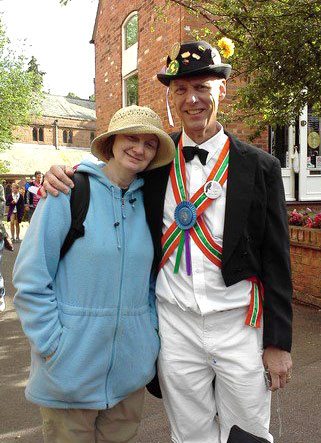 Carl & Charlotte at Kenilworth Castle.
Carl & Charlotte at Kenilworth Castle. 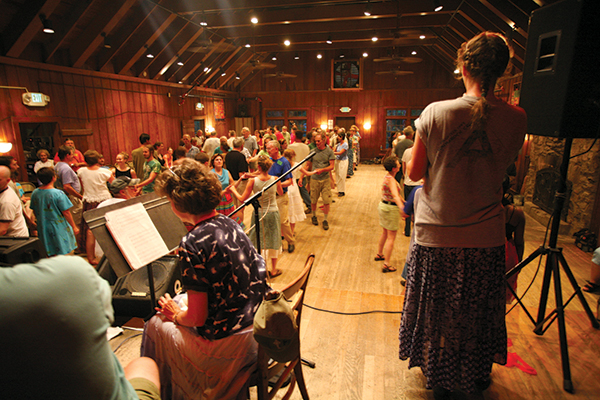 Charlotte calls a contra dance in the Community Room.[/caption]
CP: How long have you been calling at the Folk School?
CC: I came to the Folk School as a Work/Study in the winter of 2006 and I took Bob Dalsemer’s Dance Callers' Workshop that summer. So technically I’ve been calling since 2006, but I wasn’t calling regularly 'till a little time after that.
CP: Why did you get into dance calling?
CC: I’d been a contra dancer for a long time. When I was in elementary, high school and college I was involved in other kinds of dance, so I’ve always had a history of being interested in dancing. I wanted to be a provider of the activity as opposed to just a consumer. Recognizing that my skills as a musician might be a little lacking (laughs), I embraced calling as the next fun way I could be able to do that.
[caption id="attachment_11666" align="alignright" width="340"]
Charlotte calls a contra dance in the Community Room.[/caption]
CP: How long have you been calling at the Folk School?
CC: I came to the Folk School as a Work/Study in the winter of 2006 and I took Bob Dalsemer’s Dance Callers' Workshop that summer. So technically I’ve been calling since 2006, but I wasn’t calling regularly 'till a little time after that.
CP: Why did you get into dance calling?
CC: I’d been a contra dancer for a long time. When I was in elementary, high school and college I was involved in other kinds of dance, so I’ve always had a history of being interested in dancing. I wanted to be a provider of the activity as opposed to just a consumer. Recognizing that my skills as a musician might be a little lacking (laughs), I embraced calling as the next fun way I could be able to do that.
[caption id="attachment_11666" align="alignright" width="340"]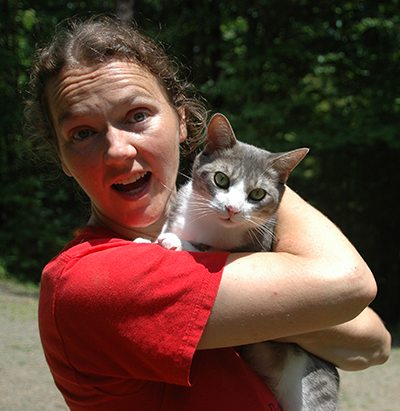 Charlotte & Charlie[/caption]
CP: What’s the best thing about calling a dance at the Folk School?
CC: What a good question! I’d say the dance community at the Folk School is one of the best for integrating all kinds of different folks. People who have been dancing for years and years and years are dancing on the same floor as those who have never ever done it before. Little kids all the way up to folks in their 70s and 80s - all on the same dance floor and everyone’s having a great time, enjoying each other's company. That’s the best part!
CP: Do you have a favorite tune?
CC: I really like the old time tune called Growling & Grumbling, which I love as a dance tune. It got this great low, mumbly beginning and then it busts into this fun, upbeat tune.
CP: Is that the same tune as Growling Old Man and Grumbling Old Woman?
CC: Yep! That’s the one! It a great tune.
CP: Where do you get your dances from?
CC: Oh goodness! Lots of sources. Primarily (and I’d say traditionally) from other callers, but also from going to other dances. I’ll go to a dance and enjoy something that I just danced, run over to the side and write it down real quick.
So I collect dances from dancing. I collect dances from other callers. And in our modern day & age, the internet is a wonderful place, not only to collect dances right off the web, but also to find literature from different places. I use the Country Dance & Song Society which is an organization up in Massachusetts that promotes folk dance and music. I peruse their bookstore pretty frequently. They are a great resource for all things dance.
Charlotte & Charlie[/caption]
CP: What’s the best thing about calling a dance at the Folk School?
CC: What a good question! I’d say the dance community at the Folk School is one of the best for integrating all kinds of different folks. People who have been dancing for years and years and years are dancing on the same floor as those who have never ever done it before. Little kids all the way up to folks in their 70s and 80s - all on the same dance floor and everyone’s having a great time, enjoying each other's company. That’s the best part!
CP: Do you have a favorite tune?
CC: I really like the old time tune called Growling & Grumbling, which I love as a dance tune. It got this great low, mumbly beginning and then it busts into this fun, upbeat tune.
CP: Is that the same tune as Growling Old Man and Grumbling Old Woman?
CC: Yep! That’s the one! It a great tune.
CP: Where do you get your dances from?
CC: Oh goodness! Lots of sources. Primarily (and I’d say traditionally) from other callers, but also from going to other dances. I’ll go to a dance and enjoy something that I just danced, run over to the side and write it down real quick.
So I collect dances from dancing. I collect dances from other callers. And in our modern day & age, the internet is a wonderful place, not only to collect dances right off the web, but also to find literature from different places. I use the Country Dance & Song Society which is an organization up in Massachusetts that promotes folk dance and music. I peruse their bookstore pretty frequently. They are a great resource for all things dance.
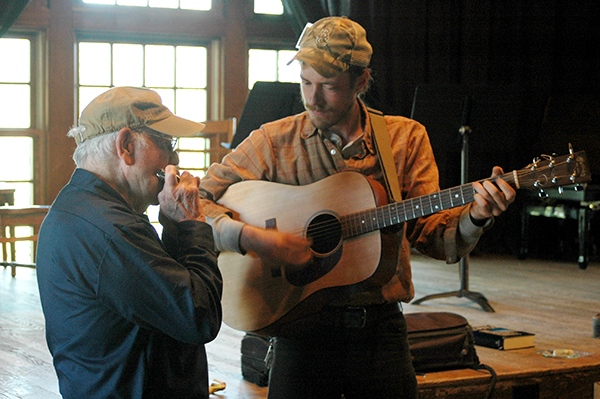 Cory and fellow Tinsmithing student play music in the Community Room after Show and Tell[/caption]
Cory and fellow Tinsmithing student play music in the Community Room after Show and Tell[/caption]
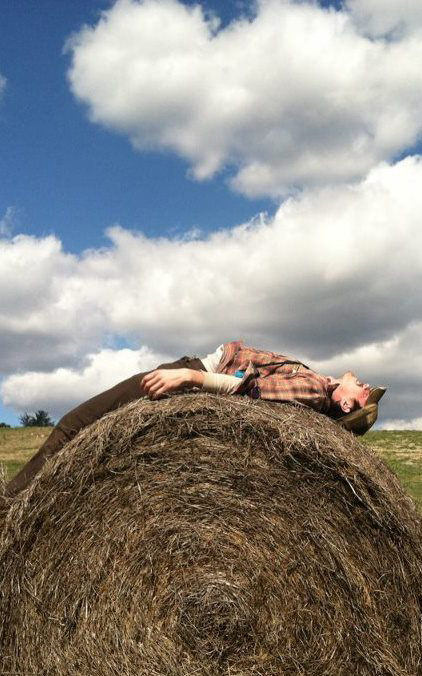 Laying on the hay in the Folk School field[/caption]
Laying on the hay in the Folk School field[/caption]
CP: When were you a Work/Study?
CS: March 14 – May 15, 2010. I remember the date clearly because I recall being mesmerized by the St. Patrick’s Day Party at the Murphy L & N Train Depot. Dale’s imitation of a leprechaun trapped in a brown paper bag - I thought that was brilliant!
CP: What have you been up to since your W/S session?
CS:I am currently a student at Berea College. I have been there for three years pursuing my undergraduate degree. I’ve also done a bit of working and traveling. I went to Ireland and Japan with the Berea Bluegrass Band. For a while before I went to Berea, I was working with Meredith Dahle (former host) at Sugarboo Farms in Blairsville. That was great because I could still be involved at the Folk School.
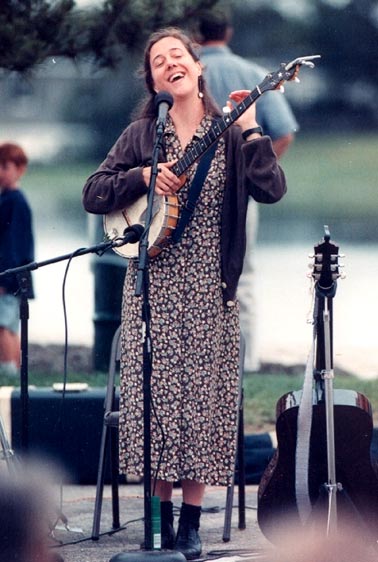 Using clogging, music and storytelling to charm Folk School audiences since 1996, Aubrey exudes a talent, grace, and humor unique to only the most tenured and talented of performers. Aubrey returns to the Folk School this September to teach two dynamite classes: Singing with Clawhammer Banjo (Sept. 8-13) and Clogging (Sept. 13-15 - Weekend). She is also scheduled to perform in special Thursday night concert, Sept. 12, 7 p.m. Don't miss out on this opportunity to learn to play, laugh, sing, and dance with Aubrey this fall!
I recently checked in with Aubrey to talk to her about her upcoming classes, the Folk School, tunes, heroes, dance moves, folk music, the Phoebe, and more! Here's what we talked about:
CP: You teach quite regularly at the Folk School. How did you find the Folk School? When did you teach your first class?
AA: I got the idea to apply to the folk school in the mid-90s when I saw that one of my dulcimer player mentors, Lorraine Hammond, from Boston, was working there. I got in touch, sent materials, and was invited to teach my first class in 1996. I thought I had died and gone to heaven-what a unique, beautiful, nurturing, and exciting place! Teaching a 30+ hour dulcimer class felt daunting back then for my younger self. I was nearly quivering on the plane as I travelled to the Folk School. I have learned a lot over the years teaching at the Folk School. The luxury of time in the week-long class has been a great opportunity to refine and expand my teaching.
CP: Do you think anyone can learn to sing? Do you have to know how sing well to take your classes?
AA: YES to first question - I think anyone can learn to sing. Absolutely NO to second question - you do not need to know how to sing well to take my classes. This question reminds me of college when I took a few drawing classes at the Rhode Island School of Design. I realized that maybe I didn't have a deeply inherent gift, but I learned the skill quite well. Some people can easily SING and it is beautiful, like when they are three years old. Some people don't have the gift quite as well, but I have never ever denied someone who wanted to sing or learn to control the pitch of their voice better. I think of two students in particular over the years who considered themselves "tone deaf" and we worked together, trained, and over time, I heard each of them sing on pitch. There were tears. It was quite a moment, very moving!
[caption id="attachment_8338" align="alignleft" width="234"]
Using clogging, music and storytelling to charm Folk School audiences since 1996, Aubrey exudes a talent, grace, and humor unique to only the most tenured and talented of performers. Aubrey returns to the Folk School this September to teach two dynamite classes: Singing with Clawhammer Banjo (Sept. 8-13) and Clogging (Sept. 13-15 - Weekend). She is also scheduled to perform in special Thursday night concert, Sept. 12, 7 p.m. Don't miss out on this opportunity to learn to play, laugh, sing, and dance with Aubrey this fall!
I recently checked in with Aubrey to talk to her about her upcoming classes, the Folk School, tunes, heroes, dance moves, folk music, the Phoebe, and more! Here's what we talked about:
CP: You teach quite regularly at the Folk School. How did you find the Folk School? When did you teach your first class?
AA: I got the idea to apply to the folk school in the mid-90s when I saw that one of my dulcimer player mentors, Lorraine Hammond, from Boston, was working there. I got in touch, sent materials, and was invited to teach my first class in 1996. I thought I had died and gone to heaven-what a unique, beautiful, nurturing, and exciting place! Teaching a 30+ hour dulcimer class felt daunting back then for my younger self. I was nearly quivering on the plane as I travelled to the Folk School. I have learned a lot over the years teaching at the Folk School. The luxury of time in the week-long class has been a great opportunity to refine and expand my teaching.
CP: Do you think anyone can learn to sing? Do you have to know how sing well to take your classes?
AA: YES to first question - I think anyone can learn to sing. Absolutely NO to second question - you do not need to know how to sing well to take my classes. This question reminds me of college when I took a few drawing classes at the Rhode Island School of Design. I realized that maybe I didn't have a deeply inherent gift, but I learned the skill quite well. Some people can easily SING and it is beautiful, like when they are three years old. Some people don't have the gift quite as well, but I have never ever denied someone who wanted to sing or learn to control the pitch of their voice better. I think of two students in particular over the years who considered themselves "tone deaf" and we worked together, trained, and over time, I heard each of them sing on pitch. There were tears. It was quite a moment, very moving!
[caption id="attachment_8338" align="alignleft" width="234"]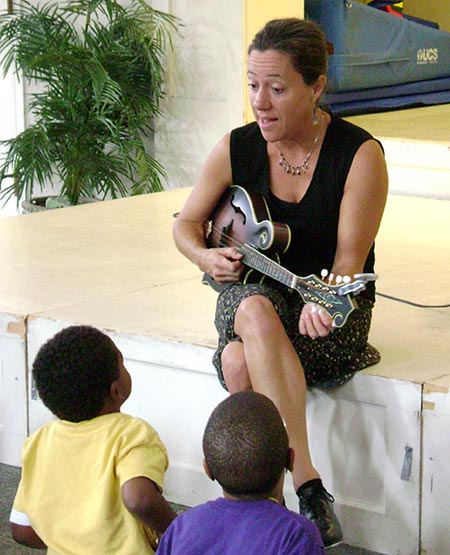 Aubrey charms audiences of all ages![/caption]
CP: What came first for you, playing music or dancing? How did you learn clawhammer banjo? How did you learn to clog?
AA: I started playing piano by ear at about 5 years old, then my parents started me on piano lessons. I quit at 13 and then picked up the guitar at age 15. I had a defining moment that summer in 1979. I figured out how to play two simple chords to a Beatles song and then I sang along and voila! I could play a song and then I was off and running and have never looked back. It was a major turning point in my life.
From there I learned to play the tin whistle, mountain dulcimer and in my late 20's, I went to Eastern Kentucky and started to learn clawhammer banjo and to dance. My friend Cari Norris taught me. She is the granddaughter of the legendary Lily May Ledford, leader of the first all-female string band, The Coon Creek Girls, in the early radio days, so I got to learn from a wonderful lineage of women. When I wasn't with Cari in Kentucky, I'd commission her to send instructional recordings (cassettes!), and she walked me through tunes by ear that way. That same time frame, I learned a few clogging steps (aka Flatfooting) and then over time, I learned traditional freestyle clogging by imitating and collecting steps from percussive dancers I would meet on the road. It was a wondrous and quite traditional way to learn. More than ten years later, somewhere in my 40's, I said to my husband Elwood, with some surprise, "I'm a dancer!" I had never taken dance as a child.
CP: Do you have a favorite tune right now?
AA: Yes, always. It is often whatever song I am learning at the moment. I am always having some kind of a love affair with a song. Two right now are: "The Jamestown Homeward Bound," a 19th century seafaring song and "Mornin's Come, Mariah's Gone," a Jean Ritchie song. Another song I have sung to myself all year is the beautiful hymn "Resignation" written in 1719 by Isaac Watts.
Pete Seeger is famous for saying a song can change the world and I believe that songs help heal our broken hearts. My father died last year and we lost a bunch of other old friends and family members nearly all at once. That one quiet and beautiful song has rescued me over and over again in the last year.
CP: As a musician who has performed multiple times at the Folk School, do you have a tune you always include in your set? How many times have you performed at the Folk School?
AA: I have performed at the Folk School about every year since 1996. It is one of my absolute utter favorite places in the world to play, teach and visit. When I am on that stage and looking at that roomful of smiling, warm, and, now, many familiar faces, I am in one of my happiest places. I often, but not always, play "The Devil and the Farmer's Wife" at the end of my shows. It's a silly, centuries-old song about the devil who comes up from Hell to talk to a dimwitted farmer about taking one of his family members back with him. The farmer says, "Don't take my son, I need him on the farm. But you can have my wife." Then we see how things turn out for the DEVIL. It's a very funny song, still, to this day! Someone captured in on video last time I was there:
Aubrey charms audiences of all ages![/caption]
CP: What came first for you, playing music or dancing? How did you learn clawhammer banjo? How did you learn to clog?
AA: I started playing piano by ear at about 5 years old, then my parents started me on piano lessons. I quit at 13 and then picked up the guitar at age 15. I had a defining moment that summer in 1979. I figured out how to play two simple chords to a Beatles song and then I sang along and voila! I could play a song and then I was off and running and have never looked back. It was a major turning point in my life.
From there I learned to play the tin whistle, mountain dulcimer and in my late 20's, I went to Eastern Kentucky and started to learn clawhammer banjo and to dance. My friend Cari Norris taught me. She is the granddaughter of the legendary Lily May Ledford, leader of the first all-female string band, The Coon Creek Girls, in the early radio days, so I got to learn from a wonderful lineage of women. When I wasn't with Cari in Kentucky, I'd commission her to send instructional recordings (cassettes!), and she walked me through tunes by ear that way. That same time frame, I learned a few clogging steps (aka Flatfooting) and then over time, I learned traditional freestyle clogging by imitating and collecting steps from percussive dancers I would meet on the road. It was a wondrous and quite traditional way to learn. More than ten years later, somewhere in my 40's, I said to my husband Elwood, with some surprise, "I'm a dancer!" I had never taken dance as a child.
CP: Do you have a favorite tune right now?
AA: Yes, always. It is often whatever song I am learning at the moment. I am always having some kind of a love affair with a song. Two right now are: "The Jamestown Homeward Bound," a 19th century seafaring song and "Mornin's Come, Mariah's Gone," a Jean Ritchie song. Another song I have sung to myself all year is the beautiful hymn "Resignation" written in 1719 by Isaac Watts.
Pete Seeger is famous for saying a song can change the world and I believe that songs help heal our broken hearts. My father died last year and we lost a bunch of other old friends and family members nearly all at once. That one quiet and beautiful song has rescued me over and over again in the last year.
CP: As a musician who has performed multiple times at the Folk School, do you have a tune you always include in your set? How many times have you performed at the Folk School?
AA: I have performed at the Folk School about every year since 1996. It is one of my absolute utter favorite places in the world to play, teach and visit. When I am on that stage and looking at that roomful of smiling, warm, and, now, many familiar faces, I am in one of my happiest places. I often, but not always, play "The Devil and the Farmer's Wife" at the end of my shows. It's a silly, centuries-old song about the devil who comes up from Hell to talk to a dimwitted farmer about taking one of his family members back with him. The farmer says, "Don't take my son, I need him on the farm. But you can have my wife." Then we see how things turn out for the DEVIL. It's a very funny song, still, to this day! Someone captured in on video last time I was there:
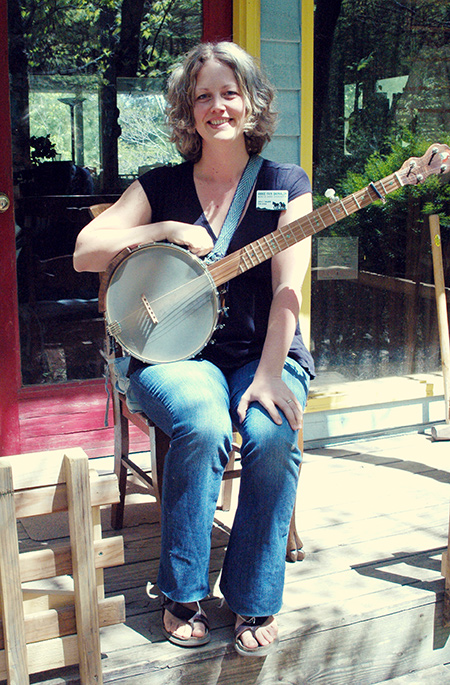 Annie Fain with her banjo[/caption]
Cory Marie: What’s is like returning to the Folk School Community as a full time resident and employee?
Annie Fain: It feels good in a deep down way. Many things are the same as they were when I was young, from the student name tags to the feel of the wooden dance floor in the Community room to the warmth of the community that surrounds the school.
Cory Marie: So, this isn’t the first time you’ve worked for the Folk School?
Annie Fain: In 2002, I came back from studying abroad at a folk school in Denmark and was awarded an upcoming craftsperson scholarship through the Southern Highland Craft Guild to take a class at Penland in Book Arts and Papermaking. I worked in the office at the Folk School as an Administrative Assistant to save for the class. It was during that time that Karen asked me to be the coordinator for Little/Middle Folk School.
I was 22 at the time and had participated in Little/Middle myself from the ages of 7-17. I was honored and eager for the challenge. Folk School people have always been very supportive and have taught me much. Later, I developed an awareness of marketing through eight years of self-employment as an artist, musician, and dancer. I took business and accounting classes, and realized the importance of being organized, marketing and networking.
Cory Marie: Are you going to stick with Bob’s plan or are you going to shake things up?
Annie Fain: Maybe a little of both! Since classes are booked a year in advance, I have the luxury of observing how 2014 develops. It gives me time to get my feet on the ground, and to get to know our audience. I plan to introduce new things within the context of how things have traditionally been done at the Folk School.
I've taken many classes at the Folk School in the past such as Cape Breton step dancing. Enrollment for dance classes has been down these last few years. I want to reassess and think about, not only bringing classes like those back, but how to fill them. I would also like to start a Cajun music and dance weekend!
Cory Marie: When did you start teaching at the Folk School?
Annie Fain: In 2004, I taught my first Book Arts class and then Bob Dalsemer hired me to teach clawhammer banjo and then Appalachian Clogging with my sister, Emolyn Liden. My father, David Liden, also a local musician, was usually my assistant for the banjo classes and it was great fun. I taught at least one banjo and book arts class every year from that time on.
[caption id="attachment_7897" align="aligncenter" width="350"]
Annie Fain with her banjo[/caption]
Cory Marie: What’s is like returning to the Folk School Community as a full time resident and employee?
Annie Fain: It feels good in a deep down way. Many things are the same as they were when I was young, from the student name tags to the feel of the wooden dance floor in the Community room to the warmth of the community that surrounds the school.
Cory Marie: So, this isn’t the first time you’ve worked for the Folk School?
Annie Fain: In 2002, I came back from studying abroad at a folk school in Denmark and was awarded an upcoming craftsperson scholarship through the Southern Highland Craft Guild to take a class at Penland in Book Arts and Papermaking. I worked in the office at the Folk School as an Administrative Assistant to save for the class. It was during that time that Karen asked me to be the coordinator for Little/Middle Folk School.
I was 22 at the time and had participated in Little/Middle myself from the ages of 7-17. I was honored and eager for the challenge. Folk School people have always been very supportive and have taught me much. Later, I developed an awareness of marketing through eight years of self-employment as an artist, musician, and dancer. I took business and accounting classes, and realized the importance of being organized, marketing and networking.
Cory Marie: Are you going to stick with Bob’s plan or are you going to shake things up?
Annie Fain: Maybe a little of both! Since classes are booked a year in advance, I have the luxury of observing how 2014 develops. It gives me time to get my feet on the ground, and to get to know our audience. I plan to introduce new things within the context of how things have traditionally been done at the Folk School.
I've taken many classes at the Folk School in the past such as Cape Breton step dancing. Enrollment for dance classes has been down these last few years. I want to reassess and think about, not only bringing classes like those back, but how to fill them. I would also like to start a Cajun music and dance weekend!
Cory Marie: When did you start teaching at the Folk School?
Annie Fain: In 2004, I taught my first Book Arts class and then Bob Dalsemer hired me to teach clawhammer banjo and then Appalachian Clogging with my sister, Emolyn Liden. My father, David Liden, also a local musician, was usually my assistant for the banjo classes and it was great fun. I taught at least one banjo and book arts class every year from that time on.
[caption id="attachment_7897" align="aligncenter" width="350"]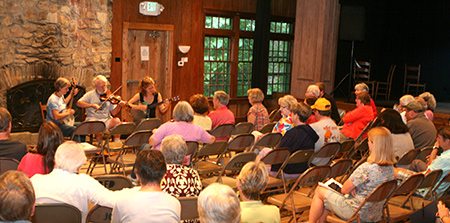 Martha, David and Annie Fain play Morningsong[/caption]
Cory Marie: I have been part of the Folk School community for only 2 years, so I’d like to hear about your story. Tell me about yourself.
Annie Fain: I was born in Charleston, West Virginia. Dad was there as part of a land study project for people who had sold their mineral rights to coal companies. The way my parents tell the story is that after my brother (Lindsey) was born, mom (Martha Owen) said "I'm going home to Murphy." Dad said, "Well, she had the kids and she had the check book," so he went with her!
Martha, David and Annie Fain play Morningsong[/caption]
Cory Marie: I have been part of the Folk School community for only 2 years, so I’d like to hear about your story. Tell me about yourself.
Annie Fain: I was born in Charleston, West Virginia. Dad was there as part of a land study project for people who had sold their mineral rights to coal companies. The way my parents tell the story is that after my brother (Lindsey) was born, mom (Martha Owen) said "I'm going home to Murphy." Dad said, "Well, she had the kids and she had the check book," so he went with her!
Brasstown Morris Dancers greeted the...


